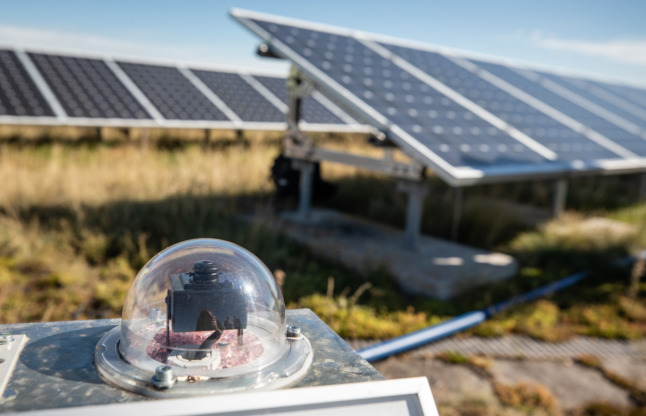Why households in Germany face even higher electricity bills

Germany's electricity prices are currently at a record high - and with supply issues and high taxes, they look set to rise yet again in the new year.
According to the comparison portal Verivox, the price of household electricity is higher than it has ever been in Germany.
Currently, a kilowatt hour of electricity costs an average of 30.54 cents. A year ago, householders were paying 28.65 cents per kilowatt hour. This equates to a price rise of 6.6 percent over 12 months.
The portal Check24 reports that eight energy suppliers have already increased or announced increases in electricity prices, with the cost hikes amounting to 3.7 percent. For a sample household with a consumption of 5,000 kilowatt hours, this means additional costs of €63 per year on average.
"The procurement costs that energy suppliers have to pay for electricity have risen significantly in recent months," the head of the German Association of Energy and Water Industries (BDEW), Kerstin Andreae, told DPA.
READ ALSO: Electricity bills in Germany – how to keep your costs down
For long-term deliveries, wholesale prices have doubled since the beginning of the year, and electricity purchased at short notice has become three times as expensive. These increased procurement costs are generally passed onto the consumer after a short delay.
The price of CO2 certificates, which businesses purchase to offset their carbon emissions, has also more than doubled in the past 24 months. In addition, the high prices in the gas wholesale trade have influenced energy prices, as generation in gas-fired power plants becomes more expensive.
"These effects cannot currently be compensated by the falling costs of renewable energies," said Andreae.
High taxes are behind the price hikes
According to the industry association BDEW, however, the main driver of the higher prices isn't the increased costs of energy procurement, but the high energy taxes levied by the government.
"Of every €100 spent on electricity bills, more than €50 go to the state," said Andreae. Between 2010 and 2020, the burden on electricity customers from taxes, levies and surcharges had risen by around 70 per cent.
"This is not only an enormous burden for consumers, but also hinders the competitiveness of the business location and inhibits environmentally friendly electricity-based applications such as electromobility or hydrogen," she added.
READ ALSO:
- EXPLAINED: Why German electricity bills are hitting record highs
- German consumers ‘pay the highest electricity prices in Europe’
Holger Lösch, Deputy Chief Executive of the Federation of German Industries, said the current soaring electricity prices are massively damaging industry and called on the next federal government to address the rising costs as a "first priority".
For consumers, the rising price of electricity hasn't gone unnoticed.
According to a survey for Verivox, three quarters of Germans want stricter measures against price increases to be put in place by the next federal government. In return, one in three (31 per cent) would be happy to stick with nuclear power - 11 percent more than three years ago.
Nevertheless, respondents don't hold out much hope for an end to the price increases - 70 percent said they did not expect taxes and levies on electricity to fall over the coming months.
Wave of price increases to come in the new year
"Most basic suppliers change their prices at the turn of the year. Therefore, we assume that more electricity suppliers will raise their prices in the coming months," said Verivox energy expert Thorsten Storck.
However, experts say it isn't possible to predict exactly how much the suppliers will add.
"Due to the increase in electricity prices on the stock exchange, a price increase for household electricity of three cents per kilowatt hour could be expected for the coming year. Renewable energies, however, should halve the increase to around 1.5 cents," Philipp Litz from the think tank Agora Energiewende told DPA.
In slightly better news for consumers, the cost of the EEG levy, which finances the promotion of green electricity plants, is expected to go down next year.
To prevent the consumer-financed levy from rising drastically, the German government is stabilising it for 2021 and 2022 with billions of euros from the budget.

Photovoltaics - or solar panels - like these ones at Stuttgart Airport are fundamental to keeping costs down. Photo: picture alliance/dpa | Christoph Schmidt
As a result, the levy was capped at 6.5 cents this year, while next year it will drop to 6 cents per kilowatt hour. BDEW head Andreae is calling for the complete abolition of the levy in order to relieve consumers and the economy.
In their election manifestos, all major parties have promised to either abolish or reduce the EEG levy.
READ ALSO: More trains and energy grants: What a Green election win could mean for Germany
So far this year, the federal government has paid €8.1 billion into the EEG fund. Next year, the amount of funding is likely to be lower because of high electricity prices on the stock exchange.
"When electricity prices rise on the stock exchange, wind and solar plant operators generate higher revenues, which leads to a falling EEG levy," Agora expert Litz explains.
The best remedy against rising electricity prices is a rapid expansion of renewable energies, he emphasised. A new federal government would have to triple the expansion of wind power and solar panels in the first 100 days of their term.
"This is central to achieving the climate targets and helps to lower the price of electricity," he added.
Comments
See Also
According to the comparison portal Verivox, the price of household electricity is higher than it has ever been in Germany.
Currently, a kilowatt hour of electricity costs an average of 30.54 cents. A year ago, householders were paying 28.65 cents per kilowatt hour. This equates to a price rise of 6.6 percent over 12 months.
The portal Check24 reports that eight energy suppliers have already increased or announced increases in electricity prices, with the cost hikes amounting to 3.7 percent. For a sample household with a consumption of 5,000 kilowatt hours, this means additional costs of €63 per year on average.
"The procurement costs that energy suppliers have to pay for electricity have risen significantly in recent months," the head of the German Association of Energy and Water Industries (BDEW), Kerstin Andreae, told DPA.
READ ALSO: Electricity bills in Germany – how to keep your costs down
For long-term deliveries, wholesale prices have doubled since the beginning of the year, and electricity purchased at short notice has become three times as expensive. These increased procurement costs are generally passed onto the consumer after a short delay.
The price of CO2 certificates, which businesses purchase to offset their carbon emissions, has also more than doubled in the past 24 months. In addition, the high prices in the gas wholesale trade have influenced energy prices, as generation in gas-fired power plants becomes more expensive.
"These effects cannot currently be compensated by the falling costs of renewable energies," said Andreae.
High taxes are behind the price hikes
According to the industry association BDEW, however, the main driver of the higher prices isn't the increased costs of energy procurement, but the high energy taxes levied by the government.
"Of every €100 spent on electricity bills, more than €50 go to the state," said Andreae. Between 2010 and 2020, the burden on electricity customers from taxes, levies and surcharges had risen by around 70 per cent.
"This is not only an enormous burden for consumers, but also hinders the competitiveness of the business location and inhibits environmentally friendly electricity-based applications such as electromobility or hydrogen," she added.
READ ALSO:
- EXPLAINED: Why German electricity bills are hitting record highs
- German consumers ‘pay the highest electricity prices in Europe’
Holger Lösch, Deputy Chief Executive of the Federation of German Industries, said the current soaring electricity prices are massively damaging industry and called on the next federal government to address the rising costs as a "first priority".
For consumers, the rising price of electricity hasn't gone unnoticed.
According to a survey for Verivox, three quarters of Germans want stricter measures against price increases to be put in place by the next federal government. In return, one in three (31 per cent) would be happy to stick with nuclear power - 11 percent more than three years ago.
Nevertheless, respondents don't hold out much hope for an end to the price increases - 70 percent said they did not expect taxes and levies on electricity to fall over the coming months.
Wave of price increases to come in the new year
"Most basic suppliers change their prices at the turn of the year. Therefore, we assume that more electricity suppliers will raise their prices in the coming months," said Verivox energy expert Thorsten Storck.
However, experts say it isn't possible to predict exactly how much the suppliers will add.
"Due to the increase in electricity prices on the stock exchange, a price increase for household electricity of three cents per kilowatt hour could be expected for the coming year. Renewable energies, however, should halve the increase to around 1.5 cents," Philipp Litz from the think tank Agora Energiewende told DPA.
In slightly better news for consumers, the cost of the EEG levy, which finances the promotion of green electricity plants, is expected to go down next year.
To prevent the consumer-financed levy from rising drastically, the German government is stabilising it for 2021 and 2022 with billions of euros from the budget.

Photovoltaics - or solar panels - like these ones at Stuttgart Airport are fundamental to keeping costs down. Photo: picture alliance/dpa | Christoph Schmidt
As a result, the levy was capped at 6.5 cents this year, while next year it will drop to 6 cents per kilowatt hour. BDEW head Andreae is calling for the complete abolition of the levy in order to relieve consumers and the economy.
In their election manifestos, all major parties have promised to either abolish or reduce the EEG levy.
READ ALSO: More trains and energy grants: What a Green election win could mean for Germany
So far this year, the federal government has paid €8.1 billion into the EEG fund. Next year, the amount of funding is likely to be lower because of high electricity prices on the stock exchange.
"When electricity prices rise on the stock exchange, wind and solar plant operators generate higher revenues, which leads to a falling EEG levy," Agora expert Litz explains.
The best remedy against rising electricity prices is a rapid expansion of renewable energies, he emphasised. A new federal government would have to triple the expansion of wind power and solar panels in the first 100 days of their term.
"This is central to achieving the climate targets and helps to lower the price of electricity," he added.
Join the conversation in our comments section below. Share your own views and experience and if you have a question or suggestion for our journalists then email us at [email protected].
Please keep comments civil, constructive and on topic – and make sure to read our terms of use before getting involved.
Please log in here to leave a comment.